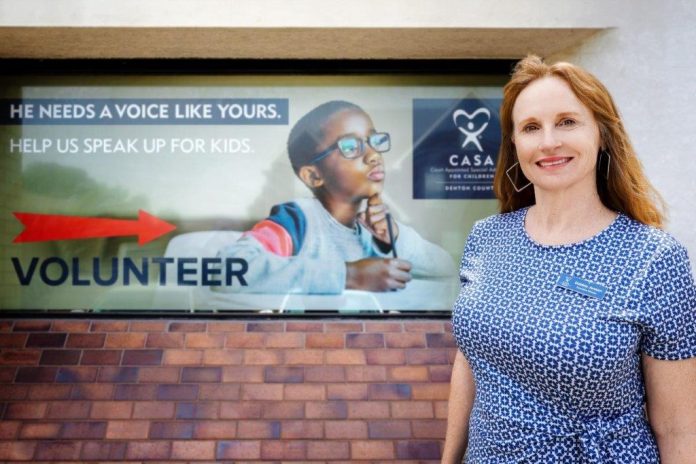A little more than 20 years ago, Debbie Jensen was working in the features department at the Big Spring Herald in West Texas when a subscriber walked in and asked if she could place a volunteers-wanted ad in the next issue of the paper. As Jensen feverishly wrote down every detail the lady wanted to include, she couldn’t help but notice that these weren’t your run-of-the-mill volunteer duties.
The ad for Court Appointed Special Advocates (CASA) of West Texas stated that, among other things, volunteers would be asked to routinely testify in court, draft court reports, and passionately advocate for the best interests of abused and neglected children.
“I said, ‘Hold on a second — are you paying these people? These can’t possibly be volunteers,’” Jensen recalled.
“She insisted they were 100% volunteers, and there were lots of them. I immediately said, ’Sign me up.’”
Fast-forward to today, and there’s still nothing Jensen wouldn’t do for CASA and the thousands of children and their families nationwide who have had their entire world turned upside down but have a better chance of coming out on the other side happy and healthy thanks to local CASA programs and the constant presence, relationships, and advocacy these selfless volunteers provide. Jensen started volunteering in West Texas in 2001 and transferred to CASA of Denton County when she and her family moved to the area in 2012.
Jensen quickly worked her way up the ranks, first as a casework supervisor and then as a recruiter. Six years ago, she became CASA of Denton County’s executive director. Under her leadership, the organization continues to produce inspiring results.
CASA volunteers are caring and highly trained individuals appointed by a district judge to represent children in court. They are ordinary people from all walks of life, and their duties really do run the gamut. This includes gathering information from everyone involved in a child’s daily life (family, foster parents, teachers, lawyers, social workers, etc.) and reporting to a judge to advocate for the child’s best interests. Ideally, CASA volunteers try to reunite each child with their family of origin. If that’s not possible, they may recommend placing the child with extended family or family friends.
In 2023 alone, over 225 community members gave their time, talent, and voices as CASA advocates. They served 550 children in the child welfare system, and judges and juries accepted 94% of their final hearing recommendations.
As a result, less than 1% of the children they served re-entered the child welfare system within six months of case closure.
“Once you see the child welfare system and how it functions or doesn’t function, and you see there are things you can do in your community to make a local child’s life easier, there’s nothing you wouldn’t do,” Jensen said. “There was a nationwide study done recently by National CASA/GAL, and the number one thing judges said CASA volunteers give a child is hope. These kids are heartbroken over what happened to their family. They’ve been pulled from their homes and are going through a tough time, but they still have to go to school, get good grades, make friends, and live a normal life. That’s hard. All of a sudden, they have this adult show up and say, ‘Let me help you.’ And that same adult keeps showing up again and again. They have someone to count on, and that goes a long way.”
Jensen added, “If you want to make a better county and community, this is what you do.”
Ironically, Jensen and the rest of her team now find themselves in a similar position as the lady who took out that ad 23 years ago.
Until recently, the 501(c)(3) nonprofit organization was blessed with a seemingly endless pool of volunteers. That pool is now in short supply. Also, state lawmakers have ordered an overhaul of the foster care system in which they will retain oversight but turn over most of the system’s responsibilities to a nonprofit contractor.
The move marks the privatization of foster care work previously done by the Texas Department of Family and Protective Services. The goal is to keep children closer to their hometowns, reduce bureaucracy, foster collaboration among local groups, and build better connections for nearby placement. But with so many new adults coming into the picture as child advocates through this privatized model, Jensen and others worry that the stability and continuity many children are getting used to will suffer immensely.
“These children face the chance of big changes, including new caseworkers, different places to live, different forms to fill out, changes in visitation locations, and more,” Jensen said. “CASA didn’t change. We simply want to make sure we’re providing the same stability. This is where more CASA volunteers will help. A dedicated volunteer will give it their all and be there for that child.”
The best part is that a volunteer can be anyone — provided they are interested in helping kids and have a good dose of grit. Being a CASA volunteer isn’t always easy, and you have to be willing to speak up and advocate strongly for things. Even when resources through the state may not be readily available, CASA volunteers know their clients and help each child by any means necessary.
“What a great place to live and work,” Jensen said. “We have amazing volunteers. They are dedicated and will do anything for their kids, and that means the world to us. We just want to find more volunteers like the ones we have.”
She added, “If you don’t think this is for you, I bet you know someone who does. Once you’re in, it’s a rewarding experience.”
Please visit casadenton.org to learn more about CASA of Denton County, including ways to volunteer and donate financially.






.jpg)







